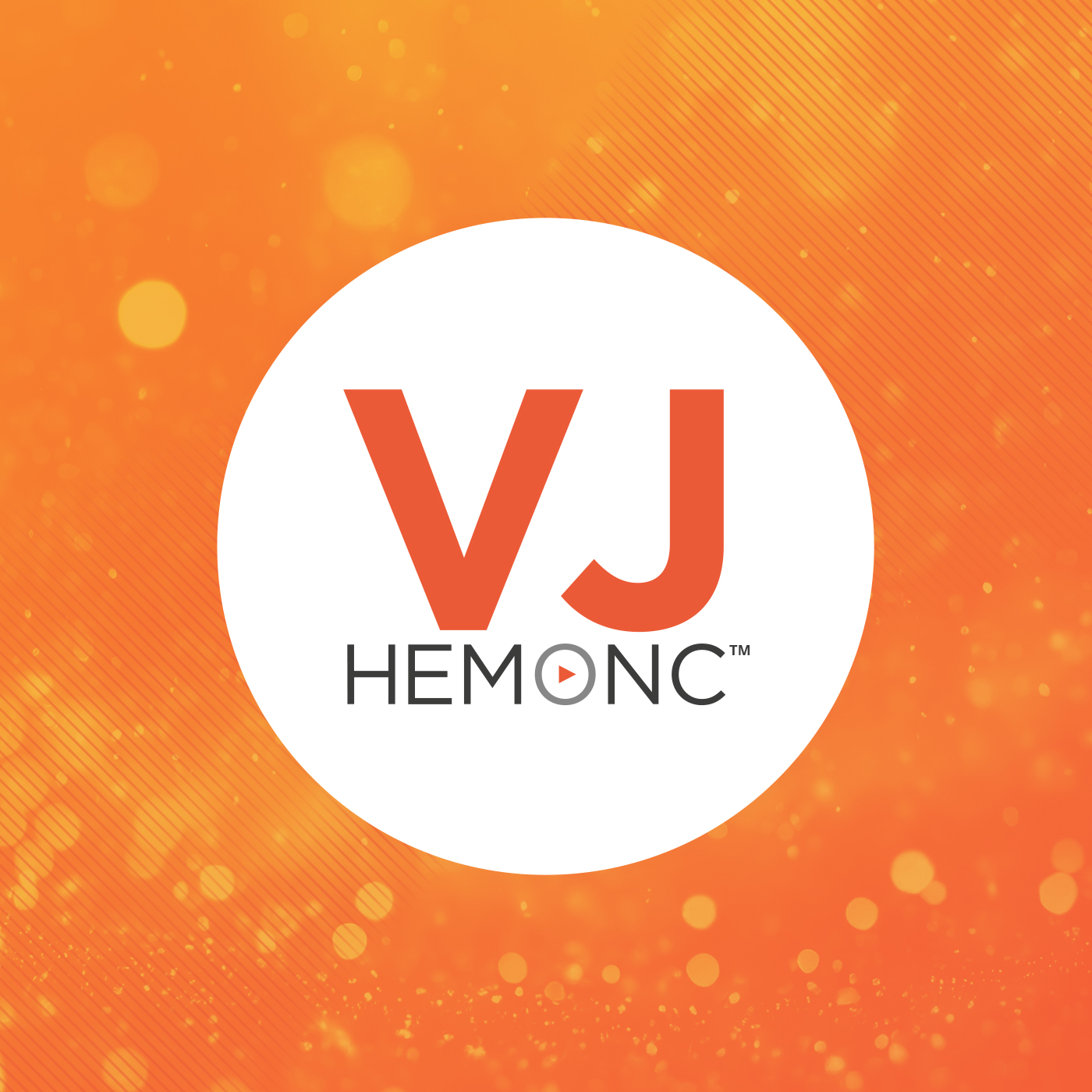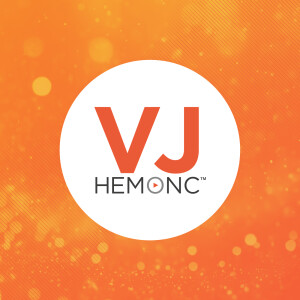
75.5K
Downloads
318
Episodes
The Video Journal of Hematology and Hematological Oncology (VJHemOnc) podcast covers the latest hematological oncology and hematology news from international experts – from leukemias, lymphomas, MDS and MPNs, to sickle cell, aplastic anemia and rare diseases. Made for healthcare professionals and researchers, we are a global, independent, open-access platform. Listen to the latest news, including cutting-edge trial updates, controversies and opinion. If you enjoy the podcast, please leave us a rating and review! For more news visit www.vjhemonc.com
The Video Journal of Hematology and Hematological Oncology (VJHemOnc) podcast covers the latest hematological oncology and hematology news from international experts – from leukemias, lymphomas, MDS and MPNs, to sickle cell, aplastic anemia and rare diseases. Made for healthcare professionals and researchers, we are a global, independent, open-access platform. Listen to the latest news, including cutting-edge trial updates, controversies and opinion. If you enjoy the podcast, please leave us a rating and review! For more news visit www.vjhemonc.com
Episodes

Friday Mar 18, 2022
ASH 2021: what did ASH 2021 mean for MDS?
Friday Mar 18, 2022
Friday Mar 18, 2022
With high rates of relapse in patients with myelodysplastic syndromes (MDS), there is a great unmet need for novel treatments that are effective and tolerable, despite the heterogeneous nature of MDS. A recent shift in personalized medicine has resulted in a number of clinical trials investigating the combination of hypomethylating agents with novel therapies which likely have a significant impact on the standard of care in MDS. For patients who fail conventional chemotherapy and autologous stem cell transplantation, chimeric antigen receptor (CAR) T-cell therapy and other immunotherapies represent promising therapies.
In this exclusive podcast, David Sallman, MD, Moffitt Cancer Center, Tampa, FL, and Andrew Brunner, MD, Massachusetts General Hospital, Boston, MA, discuss the limitations of current standards of care for MDS and explore emerging treatment targets and strategies for this condition, including drug combinations and cell therapies, especially in TP53-mutated MDS. This interview took place at the 63rd ASH Annual Meeting and Exposition Congress, Atlanta, GA, 2021.

Friday Mar 11, 2022
ASH 2021: novel developments in MPNs
Friday Mar 11, 2022
Friday Mar 11, 2022
The JAK-STAT pathway plays a pivotal role in the pathogenesis of myeloproliferative neoplasms (MPNs) including polycythemia vera, essential thrombocythemia, and myelofibrosis and JAK 1/2 inhibitors such as ruxolitinib have been vital in improving patient survival. The recent approval of ropeginterferon, an interferon therapy for patients with polycythemia vera, and investigational combination therapies in myelofibrosis represent a new generation of therapies that aim to treat MPNs.
In this podcase, Ruben Mesa, MD, UT Health San Antonio MD Anderson Cancer Center, San Antonio, TX, and Naveen Pemmaraju, MD, University of Texas MD Anderson Cancer Center, Houston, TX, share valuable insights on MPNs, including the use of LSD1 inhibitor IMG7289 and ropeginterferon in the second line setting, as well as updates in the treatment landscape of polycythemia vera and myelofibrosis. This interview took place at the 63rd ASH Annual Meeting and Exposition Congress, Atlanta, GA, 2021.

Friday Mar 04, 2022
Friday Mar 04, 2022
Multiple myeloma is always preceded by two precursor conditions known as monoclonal gammopathy of undetermined significance (MGUS) and smoldering multiple myeloma. Smoldering myeloma is associated with a higher disease burden and higher risk of progression to active disease than MGUS. The management of these precursor conditions remains unclear and the optimal timing of therapy in multiple myeloma has been a subject of debate. Whilst it would be useful to identify high-risk and asymptomatic individuals that could benefit from therapy to prevent progression to multiple myeloma, there is currently no evidence supporting the use of asymptomatic screening in clinical practice.
In this exclusive podcast recorded at the 63rd ASH Annual Meeting and Exposition Congress, Atlanta, GA, 2021, Irene Ghobrial, MD, Dana-Farber Cancer Institute, Boston, MA, and Sigurdur Kristinsson, MD, PhD, University of Iceland, Reykjavik, Iceland, explore the benefits and risks of screening for multiple myeloma precursor conditions, presenting the design and findings of the iStopMM (NCT03327597) and PROMISE (NCT03689595) studies. Dr Ghobrial and Prof. Kristinsson talk on emerging technologies to identify patients with myeloma precursor conditions and question the clinical significance of MGUS and smoldering myeloma, commenting on the mental impact of screening.

Friday Feb 25, 2022
ASH 2021: the future of cell therapies in lymphoma
Friday Feb 25, 2022
Friday Feb 25, 2022
Cell therapies including chimeric antigen receptor (CAR) T-cell therapy represent novel treatments for patients with lymphoma, especially for those who have progressed on existing chemotherapy or autologous hematopoietic stem-cell transplantation (ASCT). CAR T-cell therapy involves modified immune cells from the patient to attack the cancer and there are currently five approved by the FDA: idecabtagene vicleucel, lisocabtagene maraleucel, tisagenlecleucel, brexucabtagene autoleucel, and axicabtagene ciloleucel.
In this exclusive podcast, Yi Lin, MD, PhD, Mayo Clinic, Rochester, MN, Krish Patel, MD, Swedish Cancer Institute, Seattle, WA, Nathan Fowler, MD, The University of Texas MD Anderson Cancer Center, Houston, TX, Michael Bishop, MD, University of Chicago, Chicago, IL, and Stephen Ansell, MD, PhD, Mayo Clinic, Rochester, MN, discuss important data from the ELARA (NCT03568461) and BELINDA (NCT03570892) trials, NK cell therapies, and the role of cell therapies in treating lymphoma. This interview took place at the 63rd ASH Annual Meeting and Exposition Congress, Atlanta, GA, 2021.

Friday Feb 18, 2022
ASH 2021: highlights in CLL clinical trials
Friday Feb 18, 2022
Friday Feb 18, 2022
Treatments such as ibrutinib and venetoclax, which target the Bruton tyrosine kinase (BTK) pathway and the B-cell lymphoma 2 (BCL-2) protein respectively, have proven to be efficacious as targeted therapies for previously untreated patients with chronic lymphocytic leukemia (CLL). For patients who have progressed on existing therapies, novel BTK inhibitors such as pirtobrutinib and MK1026 represent promising alternative treatment options.
In today’s podcast, Jennifer Woyach, MD and Adam Kittai, MD, Ohio State University College of Medicine in Columbus, OH, provide their perspectives on key themes and topics in the treatment and management of CLL. They evaluate findings from the CAPTIVATE, GLOW and CLL13 clinical trials, long-term follow up data of the ALLIANCE A041202 and SEQUOIA trials, novel agents and the role of MRD in CLL.
This interview took place at the 63rd ASH Annual Meeting and Exposition Congress, Atlanta, GA, 2021.

Thursday Feb 10, 2022
ASH 2021: updates in FLT3-mutated AML
Thursday Feb 10, 2022
Thursday Feb 10, 2022
FMS-like tyrosine kinase 3 (FLT3) mutations are common in patients with acute myeloid leukemia (AML), and is often associated with a poor prognosis. Despite the development of FLT3 inhibitors such as midostaurin, sorafenib, and qauizartinib, patients often progress on these therapies due to secondary mutations. Various strategies to improve patient outcomes such novel combinations with other agents including hypomethylating agents or venetoclax are currently under investigation.
In this podcast, Naval Daver, MD, University of Texas MD Anderson Cancer Center, Houston, TX, and Eunice Wang, MD, Roswell Park Comprehensive Cancer Center, Buffalo, have an insightful discussion on FLT3-mutated acute myeloid leukemia (AML) updates presented at the ASH 2021 annual meeting. They give an overview of the use of FLT3 inhibitors in combination with other agents, as well as trial data from the LACEWING trial (NCT02752035) of gilteritinib in combination with azacitidine in the frontline setting.
This interview took place at the 63rd ASH Annual Meeting and Exposition Congress, Atlanta, GA, 2021.

Wednesday Feb 02, 2022
The Lymphoma Sessions: post-ASH 2021
Wednesday Feb 02, 2022
Wednesday Feb 02, 2022
The 63rd American Society of Hematology (ASH) annual meeting saw a plethora of updates in lymphoma. While most of them generated a lot of fruitful conversations, some of the breakthroughs have the potential to change practice.
In this roundtable discussion, Graham Collins, MA, MBBS, MRCP, FRCPath, DPhil, Oxford University Hospitals NHS Foundation Trust, Oxford, UK, and Wendy Osborne, MBBS (Hons), MRCP, FRCPath, Freeman Hospital, Newcastle upon Tyne Hospitals NHS Foundation Trust, Newcastle, UK, review the most exciting updates in lymphoma from the 2021 ASH annual meeting and reflect on how the data may impact clinical practice in the UK.

Tuesday Oct 26, 2021
COSTEM: maintenance therapies for FLT3+ AML
Tuesday Oct 26, 2021
Tuesday Oct 26, 2021
The FMS-like tyrosine kinase 3 (FLT3) gene is mutated in approximately 30% of patients with acute myeloid leukemia (AML) and is indicative of a poor prognosis. Allogeneic hematopoietic stem cell transplantation (alloHSCT) is commonly recommended to this patient population as a consolidation therapy after first complete remission. Nevertheless, the rate of relapse post-alloHSCT remains high and effective post-transplant maintenance therapies represent an unmet clinical need. The FLT3 tyrosine kinase inhibitors (TKIs), including sorafenib, midostaurin and gilteritinib, have demonstrated improved outcomes for patients undergoing alloHSCT. Multiple ongoing trials are currently investigating these agents as maintenance therapies.
In this deep dive, Andreas Burchert, MD, University of Marburg, Marburg, Germany, discusses updates on post-transplant maintenance therapies for patients with FLT3+ AML, focusing on data from clinical trials evaluating four tyrosine kinase inhibitors: sorafenib, midostaurin, gilteritinib and quizartinib, as presented at the 6th Congress on Controversies in Stem Cell Transplantation and Cellular Therapies (COSTEM).

Tuesday Oct 26, 2021
COSTEM: the role of alloHSCT in ALL
Tuesday Oct 26, 2021
Tuesday Oct 26, 2021
Over the past few years, the therapeutic landscape for acute lymphoblastic leukemia (ALL) has dramatically evolved, with the development of highly effective tyrosine kinase inhibitors (TKIs) and bispecific antibodies. These therapies have considerably improved outcomes for patients and many achieve durable remissions, raising the debate of whether allogeneic hematopoietic stem cell transplantation (alloHSCT) should still be offered to all patients with ALL.
In this podcast featuring Mohamad Mohty, MD, PhD, Saint-Antoine Hospital and Sorbonne University, Paris, France, and Robin Foà, MD, Sapienza University of Rome, Rome, Italy, discuss the relevance of alloHSCT in the current therapeutic landscape for ALL.

Tuesday Oct 05, 2021
SOHO 2021: amyloidosis treatment updates
Tuesday Oct 05, 2021
Tuesday Oct 05, 2021
Over the last two decades the outcomes of patients with amyloidosis have substantially improved with timely diagnosis, the use of chemotherapeutic agents and improved patient selection for autologous stem cell transplantation (ASCT); however, for patients who are diagnosed at later stages or who are ineligible for ASCT the prognosis is poorer. Recently, the introduction of daratumumab has shown promising results for patients with both newly diagnosed and relapsed/refractory amyloidosis and there have been a number of Phase II/III trials aiming to help guide treatment decision-making and improve patient outcomes.
In today’s podcast, Angela Dispenzieri, MD, of the Mayo Clinic, Rochester, MN, gives an overview of key updates in the treatment landscape of amyloidosis, as presented at the ninth annual meeting of the Society of Hematologic Oncology (SOHO 2021) congress.
